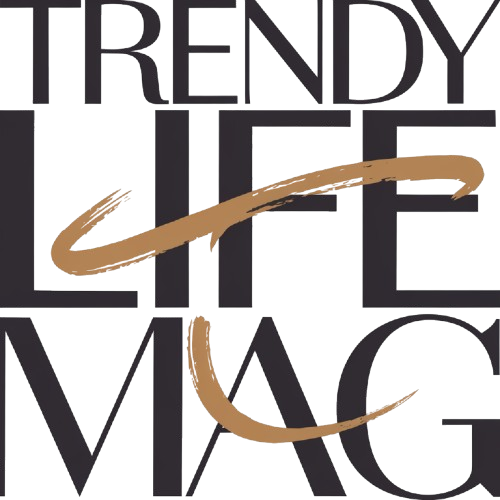Table of Contents
As consumers become increasingly conscious of the ingredients in their skincare products, the rise of “clean beauty” has transformed the beauty industry. So, what is clean beauty? At its heart, clean beauty is a commitment to using safe, non-toxic ingredients that prioritize skin health while avoiding harmful chemicals like parabens, sulfates, and synthetic fragrances. It’s about transparency—consumers want to know exactly what they’re putting on their skin.
The growing interest in clean beauty reflects a shift towards more mindful routines. More than just a trend, this movement emphasizes the benefits of using clean beauty products for both personal health and environmental sustainability. Whether you’re seeking to avoid irritants or support brands that are cruelty-free and eco-conscious, clean beauty delivers solutions that cater to both your skin and your values.
From skincare to makeup, the demand for cleaner formulations is rapidly shaping the future of beauty, with brands innovating to meet this conscious consumer demand. Clean beauty is more than a label—it’s a lifestyle shift, proving that skincare can be effective, luxurious, and responsible all at once.
Understanding Clean Beauty: What Sets It Apart
At its core, clean beauty refers to products formulated with safe, non-toxic ingredients that avoid harmful chemicals like parabens, sulfates, phthalates, and synthetic fragrances. Clean beauty prioritizes transparency, meaning brands clearly disclose their ingredients and focus on what’s safe for both skin health and the environment.
Unlike conventional beauty products, which may contain potentially harmful additives, clean beauty offers a solution that works effectively without compromising safety.
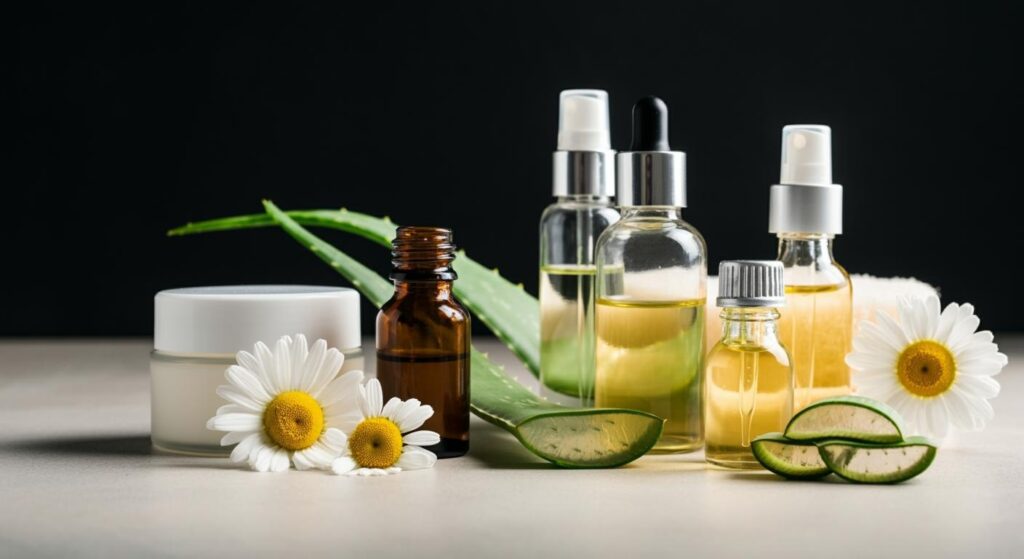
Core Principles of Clean Beauty
The foundation of clean beauty lies in using non-toxic, scientifically proven ingredients that are safe for long-term use. Brands adhering to clean beauty standards often avoid controversial chemicals linked to skin irritation, hormone disruption, or other health risks.
Instead, they focus on natural, plant-based, or ethically sourced synthetic ingredients that nourish and protect the skin. Additionally, clean beauty embraces sustainable and cruelty-free practices, ensuring a minimal environmental footprint and no animal testing.
Clean Beauty vs. Organic and Natural Beauty
There’s often confusion around clean beauty vs. organic beauty or natural beauty. While clean beauty revolves around ingredient safety, it doesn’t necessarily mean a product is organic or entirely natural.
Organic beauty, on the other hand, uses ingredients farmed without synthetic pesticides or fertilizers, and natural beauty refers to products with ingredients sourced from nature.
However, neither organic nor natural labels guarantee safety from irritants or harmful chemicals. Clean beauty bridges that gap by combining safe, effective ingredients, regardless of whether they’re synthetic or organic.
Common Misconceptions
One common misconception is that clean beauty only uses natural ingredients. In reality, clean beauty includes both natural and lab-created ingredients, as long as they meet safety standards.
This flexibility allows for greater innovation, giving consumers safe, effective products that support both skin health and the environment.
The Benefits of a Clean Beauty Routine
Adopting a clean beauty routine offers significant advantages, both for your skin and the environment.
With a focus on non-toxic ingredients, clean beauty minimizes exposure to harmful chemicals, which can lead to healthier, more resilient skin.
Improved Skin Health
One of the key benefits of using clean beauty products is the positive impact on skin health. By avoiding harsh chemicals like parabens, sulfates, and artificial fragrances, clean beauty products reduce the risk of irritation, breakouts, and long-term damage.
This is especially beneficial for those with sensitive skin or conditions like eczema or rosacea. Studies have shown that certain chemicals in conventional beauty products can disrupt the skin’s natural barrier, leading to inflammation and sensitivity.
Clean beauty formulations, often packed with soothing ingredients like aloe vera, hyaluronic acid, and natural oils, help maintain a balanced and hydrated complexion.
Reduced Risk of Irritation and Allergic Reactions
Clean beauty focuses on gentle, hypoallergenic ingredients, reducing the likelihood of allergic reactions. A 2019 study published in the Journal of Clinical and Aesthetic Dermatology found that 24% of women experienced skin reactions from cosmetic products, with synthetic fragrances being a major culprit.
Environmental Impact
The clean beauty movement also promotes sustainable practices. Brands often use eco-friendly packaging, biodegradable materials, and responsibly sourced ingredients, significantly reducing environmental harm.
A 2020 report by Zero Waste Europe highlighted that the beauty industry generates 120 billion units of plastic packaging annually. Clean beauty brands tackle this by adopting recyclable and refillable packaging, minimizing their carbon footprint and waste production.
In contrast to organic beauty, which primarily focuses on farming methods, clean beauty aims for overall safety and sustainability, giving consumers confidence in their choices for both personal and environmental health.
Building Your Clean Beauty Routine: Step-by-Step for Clear, Healthy Skin
Creating a clean beauty skincare routine tailored to your skin type and concerns is key to achieving clear, radiant skin while avoiding harmful chemicals.
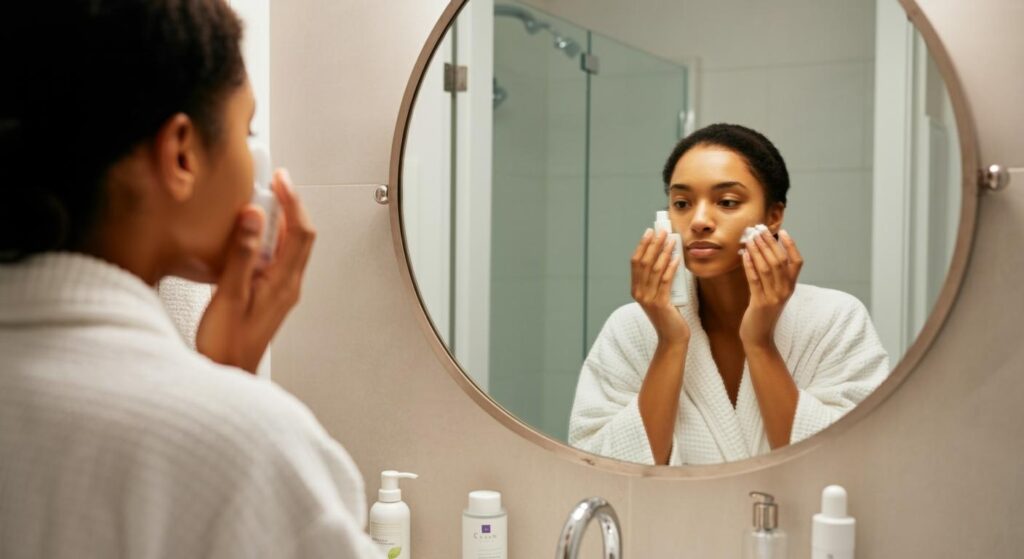
Clean beauty products focus on safe, effective ingredients that nourish your skin. Here’s how to build a clean beauty routine step-by-step.
1. Cleanse: Start Fresh
Cleansing removes dirt, oil, and impurities. Look for cleansers free from sulfates and synthetic fragrances, which can irritate the skin.
Cleanser Selection Based on Skin Type:
- Oily Skin: Use a gel or foam cleanser with ingredients like tea tree oil to reduce oil and prevent breakouts.
- Dry Skin: Opt for a cream or oil-based cleanser with hydrating ingredients like aloe vera.
- Combination Skin: Choose a balancing cleanser with cucumber extract to cleanse oily areas while soothing dry patches.
- Sensitive Skin: Pick a fragrance-free, gentle cleanser with calming ingredients like chamomile.
Pro Tip: Cleanse your skin twice daily—morning and night.
2. Tone: Balance and Prep
Toners restore pH balance and prep the skin for treatment. A clean beauty toner should be alcohol-free.
Toner Selection Based on Skin Type:
- Oily Skin: Witch hazel or tea tree oil toners control oil and tighten pores.
- Dry Skin: Rose water or hyaluronic acid toners provide extra hydration.
- Combination Skin: Green tea or chamomile toners balance hydration while soothing the skin.
- Sensitive Skin: Aloe vera toners calm and refresh without irritation.
Pro Tip: Apply toner with a cotton pad or spritz directly onto your skin.
3. Treat: Target Concerns
This step addresses specific issues like acne, fine lines, or dullness. Clean beauty treatments, like serums, use non-toxic ingredients for effective results.
Treatment Selection Based on Skin Type:
- Acne-Prone Skin: Salicylic acid or tea tree oil serums help clear blemishes.
- Dull Skin: Vitamin C serums brighten and reduce dark spots.
- Aging Skin: Bakuchiol or peptide serums promote firmness and reduce wrinkles.
- Dehydrated Skin: Hyaluronic acid serums deeply hydrate.
Pro Tip: Apply treatment after toning and allow it to absorb before moving on.
4. Moisturize: Lock in Hydration
Moisturizing is essential for all skin types, as it locks in hydration and protects the skin barrier. Clean beauty moisturizers should be free of synthetic dyes and fragrances.
Moisturizer Selection Based on Skin Type:
- Oily Skin: Use lightweight, non-comedogenic moisturizers with aloe vera or jojoba oil.
- Dry Skin: Rich, emollient moisturizers with shea butter or squalane deeply nourish.
- Combination Skin: A lightweight moisturizer with hyaluronic acid hydrates without adding greasiness.
- Sensitive Skin: Choose fragrance-free moisturizers with calming ingredients like oat extract.
Pro Tip: Moisturizing helps balance oil production, even in oily skin types.
5. Sunscreen: UV Protection (Morning Only)
Sunscreen is essential for skin protection. Clean beauty sunscreens use mineral-based ingredients like zinc oxide for broad-spectrum protection.
Sunscreen Selection Based on Skin Type:
- Oily Skin: Choose a lightweight, oil-free sunscreen with a matte finish.
- Dry Skin: Hydrating sunscreens with hyaluronic acid protect and moisturize.
- Sensitive Skin: Use fragrance-free, zinc oxide sunscreens.
Pro Tip: Apply sunscreen daily, even indoors.
6. Exfoliate (1-2 Times a Week)
Exfoliation removes dead skin cells and reveals brighter skin. Clean beauty exfoliants use natural ingredients like fruit enzymes or gentle acids.
Exfoliant Selection Based on Skin Type:
- Oily or Acne-Prone Skin: BHA-based exfoliants with salicylic acid clear pores.
- Dry or Sensitive Skin: Enzyme exfoliants with papaya extract exfoliate gently.
Pro Tip: Exfoliate only once or twice a week to avoid damaging your skin barrier.
7. Patch Testing: Ensure Safety
Patch testing is crucial when introducing new products. Apply a small amount to a discreet area and wait 24-48 hours to check for irritation.
Pro Tip: Patch testing is especially important for sensitive skin and products with active ingredients.
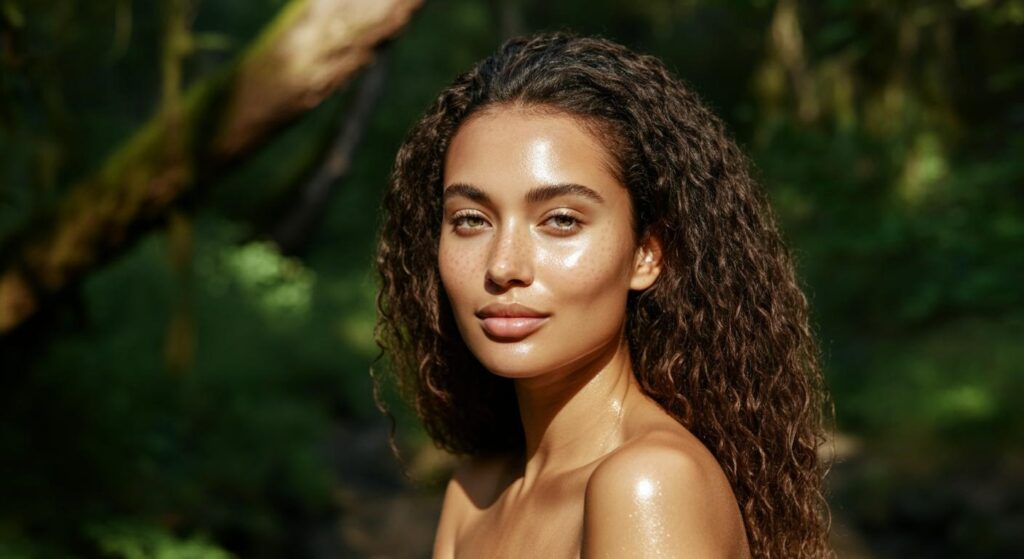
Choosing the Right Clean Beauty Products: A Practical Guide
Selecting the best clean beauty products can seem overwhelming, but with the right approach, you can make informed choices that benefit both your skin and the environment. Here’s how to navigate your options with confidence.
Key Ingredients to Look For
When choosing natural clean beauty products you can trust, focus on ingredients that nourish and protect your skin while promoting long-term health. Look for the following:
- Antioxidants: Vitamin C, green tea extract, and vitamin E help fight free radicals, protect the skin from environmental damage, and reduce signs of aging.
- Natural Oils: Jojoba oil, argan oil, and rosehip seed oil provide hydration, soothe the skin, and balance oil production. These oils are non-comedogenic, making them suitable for various skin types.
- Hyaluronic Acid: Naturally found in the skin, this ingredient hydrates deeply without clogging pores, making it ideal for maintaining moisture levels.
Ingredients to Avoid
While many conventional beauty products contain ingredients that may harm your skin, clean beauty offers safer alternatives. Here’s what to avoid:
- Parabens: Commonly used as preservatives, parabens have been linked to hormone disruption and are best avoided in clean formulations.
- Sulfates: These harsh detergents, found in many cleansers and shampoos, strip the skin of natural oils, leading to irritation and dryness.
- Synthetic Fragrances: Artificial fragrances can cause allergic reactions and skin sensitivities. Opt for products that use natural fragrances, like essential oils, or are fragrance-free.
Reading Labels and Certifications
Understanding product labels is crucial when selecting clean beauty products. Many brands proudly display certifications, but knowing what they mean is key:
- Clean Certified: This label ensures the product is free from harmful chemicals like parabens, sulfates, and phthalates. Brands like Sephora offer a “Clean at Sephora” certification, providing reassurance that the product meets these clean standards.
- Non-Toxic: Products labeled as non-toxic guarantee they don’t contain ingredients that are harmful to human health. These products should be safe for long-term use.
- Cruelty-Free and Vegan: Look for these labels to ensure that no animal testing was involved and that the product contains no animal-derived ingredients.
Final Tips
When choosing clean beauty products, take the time to read labels carefully, research the brand’s transparency, and look for trusted certifications. Select products tailored to your specific skin needs while avoiding harmful ingredients. By doing so, you’ll ensure that your skincare routine is both safe and effective.
Best Clean Beauty Brands to Consider in 2024
The best clean beauty brands prioritize high-quality ingredients and ethical practices, making it easier to choose products that are both safe and effective.
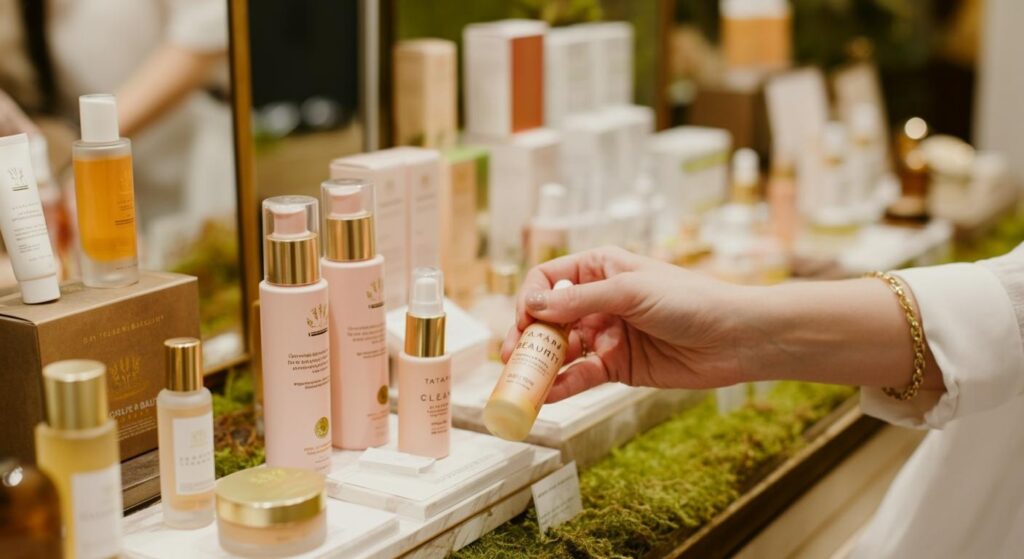
Here’s a list of top brands that excel in clean beauty, including some affordable options for those on a budget.
1. Tata Harper
Known for luxury, Tata Harper is a pioneer in clean beauty. The brand focuses on 100% natural, organic ingredients sourced from its own farm. Every product is formulated without synthetic chemicals or artificial ingredients.
Their standout product, the Regenerating Cleanser, offers gentle exfoliation and is beloved for its high-performance results.
- Philosophy: High-quality, 100% natural ingredients
- Standout Product: Regenerating Cleanser
2. Ilia Beauty
Ilia Beauty merges skincare with makeup, offering products that deliver flawless results while being kind to your skin.
Their focus is on balancing natural and safe synthetics to create effective formulas. The Super Serum Skin Tint is a favorite, providing SPF protection, hydration, and light coverage.
- Philosophy: Clean makeup that cares for your skin
- Standout Product: Super Serum Skin Tint SPF 40
3. Herbivore Botanicals
Herbivore Botanicals is known for its minimalist approach to skincare, using only high-quality, plant-based ingredients. Their products are vegan, cruelty-free, and free of synthetic preservatives.
The Lapis Facial Oil is a standout, particularly for those with acne-prone skin, as it helps balance oil production and calm irritation.
- Philosophy: Simple, plant-based skincare with transparency
- Standout Product: Lapis Facial Oil
4. Versed
For those seeking affordable clean beauty brands in 2024, Versed offers a wide range of skincare products that are budget-friendly without compromising on quality.
Free from parabens, sulfates, and synthetic fragrances, their products are designed for all skin types. The Just Breathe Clarifying Serum is perfect for balancing oily and acne-prone skin.
- Philosophy: Affordable, accessible clean beauty
- Standout Product: Just Breathe Clarifying Serum
5. The Ordinary
The Ordinary is known for its science-backed, clean formulations at unbeatable prices, making it one of the top clean beauty brands for beginners.
Their products focus on single-ingredient solutions, like the Niacinamide 10% + Zinc 1% Serum, which is highly effective for reducing blemishes and balancing oil production.
- Philosophy: Affordable, no-frills skincare with a focus on transparency
- Standout Product: Niacinamide 10% + Zinc 1% Serum
Special Considerations for Sensitive Skin
Navigating the clean beauty landscape can be tricky for individuals with sensitive skin, but choosing the right products can make a significant difference.
Clean beauty, with its focus on safe, non-toxic ingredients, often provides a gentler option compared to conventional products. However, it’s still essential to carefully select formulations designed specifically for sensitive skin to avoid irritation.
What to Look for in Clean Beauty Products for Sensitive Skin
When selecting the best clean beauty products for sensitive skin, focus on ingredients known for their soothing properties, such as aloe vera, chamomile, and oatmeal.
Avoid potential irritants like synthetic fragrances, alcohol, and essential oils, which can sometimes cause reactions in sensitive skin. Opt for products that are fragrance-free and labeled hypoallergenic or dermatologically tested.
Recommended Gentle Clean Beauty Products:
- Cleanser: Pai Skincare Camellia & Rose Gentle Hydrating Cleanser – A calming, non-drying cleanser that removes impurities without irritating the skin.
- Moisturizer: Drunk Elephant Lala Retro Whipped Cream – Rich in soothing plant oils, this cream is fragrance-free and deeply hydrating for sensitive skin.
- Serum: The Ordinary Hyaluronic Acid 2% + B5 – A gentle hydrating serum that replenishes moisture without causing irritation.
Can Clean Beauty Products Help with Acne?
Yes, clean beauty products can effectively address acne, especially for those with sensitive, acne-prone skin. Look for gentle, non-comedogenic formulations with natural acne-fighting ingredients like salicylic acid, tea tree oil, and niacinamide.
These ingredients help treat breakouts without the harsh side effects common in conventional acne treatments.
Top Brand Recommendations for Sensitive Skin:
- Pai Skincare – Specializes in products specifically for sensitive and reactive skin.
- Avène – Known for its soothing formulations, ideal for calming irritated or sensitive skin.
- Cocokind – Offers gentle, affordable clean beauty options suitable for sensitive skin.
If you’re interested in diving deeper into a clean and non-toxic skincare approach, check out our guide on How to Transition to a Natural Skincare Routine for practical tips on making the switch.
Embracing Clean Beauty for Healthier Skin and a Greener Future
Choosing clean beauty products isn’t just a trend—it’s a conscious decision for both personal health and environmental sustainability. By prioritizing non-toxic ingredients, ethical sourcing, and eco-friendly packaging, clean beauty ensures you can care for your skin without harmful chemicals or environmental harm. Whether you’re learning how to build a clean beauty routine or refining your current one, selecting products that suit your skin type is key to achieving healthy, clear skin.
Throughout this article, we’ve covered essential steps for creating a clean beauty routine, from selecting the right cleanser and moisturizer to understanding the importance of patch testing. Brands that focus on transparency and safety, such as Tata Harper, Ilia, and Versed, offer reliable products for all skin types, including those with sensitive skin.
As you begin your clean beauty journey, remember that every step counts—both for your skin and the planet. Choose products confidently, knowing you’re supporting safer beauty standards and contributing to a more sustainable future.
Clean Beauty FAQs
This FAQ section provides quick and clear answers to help you navigate the clean beauty world. From understanding what clean beauty is to picking the right products for your skin, we’ve got you covered.
What is clean beauty?
Clean beauty refers to products made with safe, non-toxic ingredients, avoiding harmful chemicals like parabens, sulfates, and synthetic fragrances. It emphasizes transparency, ethical sourcing, and sustainability.
How do I start a clean beauty routine?
Start by replacing your essentials—cleanser, moisturizer, and sunscreen—with clean beauty alternatives. Gradually add treatments like serums based on your skin needs. Always read labels and patch test new products.
What are the best clean beauty brands?
Some top clean beauty brands include “Tata Harper,” “Ilia Beauty,” “Herbivore Botanicals,” and “The Ordinary.” These brands are known for their commitment to safe, effective ingredients and eco-friendly practices.
Is clean beauty really better for your skin?
Yes, clean beauty can be better for your skin, especially for those with sensitivities. The products avoid harsh chemicals that can irritate or damage the skin, making them a gentler option for long-term use.
What makes a product “clean beauty”?
A clean beauty product avoids harmful ingredients like parabens, sulfates, phthalates, and synthetic fragrances. It is formulated with safe, non-toxic ingredients and often has certifications like “clean” or “non-toxic.”
What are the benefits of using clean beauty products?
The benefits include healthier skin, fewer irritations, and reduced exposure to harmful chemicals. Additionally, many clean beauty products support eco-friendly practices and ethical sourcing.
How does clean beauty differ from organic beauty?
Clean beauty focuses on non-toxic ingredients, while organic beauty is about farming practices, ensuring ingredients are grown without synthetic pesticides. Organic products may still contain approved chemicals, while clean beauty avoids them.
Are there affordable clean beauty brands?
Yes, affordable clean beauty brands include “Versed” and “The Ordinary,” which offer effective products without high prices.
Can clean beauty products help with acne?
Yes, clean beauty products with ingredients like salicylic acid, tea tree oil, and niacinamide can help treat acne without harsh chemicals that can aggravate sensitive skin.
What should I look for in clean beauty makeup?
Look for makeup free from parabens, phthalates, and synthetic dyes. Natural pigments, mineral-based formulas, and non-comedogenic ingredients ensure your makeup is both safe and skin-friendly.
